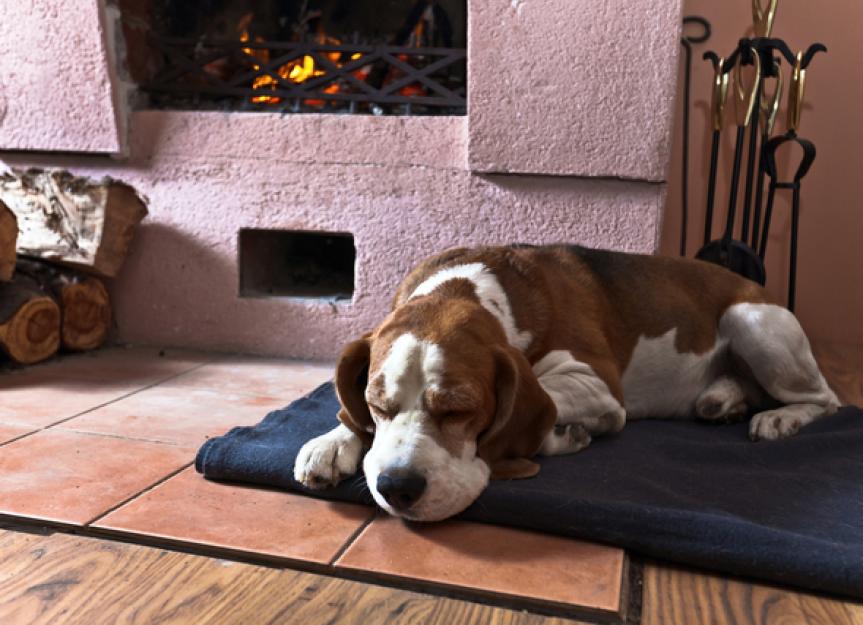Should You Worry If Your Older Dog Sleeps All Day?
Reviewed for accuracy on September 4, 2018, by Dr. Katie Grzyb, DVM
Ever notice your senior dog sleeping all day? If you’ve ever had an older dog, you know that they like to sleep for long periods of time. But if you’re unsure of what anormal amount of sleep is for a senior dog, or are wondering if its normal that your senior dog sleeps all day, you’re not alone.
How Long Do Senior Dogs Sleep?
There’s no one age that automatically makes a dog a “senior dog.” Senior status depends on the breed of the dog and how long the dog lives, says Dr. Ashley Rossman, DVM, at Glen Oak Dog & Cat Hospital in Glenview, Illinois. Larger dogs have shorter lifespans.
For example, aGreat Danecan be considered a senior at 5 years old since they don’t live as long, whereas aMalteseis not considered a senior until about 7 or 8 years of age.
“The older they get, the more sleep they need, and that’s OK,” says Dr. Rossman. Just like senior citizens need more sleep, an older dog sleeps a lot when compared to their younger counterparts.
On the higher end of the scale, a senior dog can sleep up to 18-20 hours a day, says Dr. Rossman. She estimates that the lower end is probably around 14-15 hours per day.
Pay Attention to Your Individual Dog’s Sleep Patterns
“We don’t have any research into the number of hours a particular dog needs or should have,” says Dr. Ellen Lindell, a board-certified behaviorist with Veterinary Behavior Consultations, a company based in New York and Connecticut.
Since there are no official guidelines when it comes to how many hours a pet should sleep, observing your dog’s regular sleeping patterns is key. If you notice any sudden changes in sleep behavior, it might be time to call a vet.
“Use the dog as its own baseline and look for changes,” says Dr. Lindell. For instance, if your dog always follows you around the house and then suddenly stops doing that, take note. Likewise, if your dog is usually excited to play fetch with you and that enthusiasm is gone, pay attention.
“One isolated change, I might watch,” she says. “But if many isolated changes happen at once, then I’d be concerned … It really is a matter of degree.”
Provide an Environment for Sleep
Dr. Lindell says that dogs need a quiet place to nap or escape to if they want that. “Most dogs like a bed of some sort. Bed preference is up to the dog,” says Dr. Lindell. “Some like to curl; some to stretch.”
For senior dogs, there are a variety of beds available to accommodate specific needs. Dogs who suffer from arthritis or joint pain might enjoy an orthopedic dog bed, like theFrisco orthopedic bolster sofa dog bed. An elevated dog bed is also a great option for older dogs because the hammock-type style can help to alleviate pressure on their joints and muscles. A bolstered dog bed can give senior dogs some extra support.
Above all, be sure to buy a bed that meets your individual dog’s needs.
When It’s Time to Seek Out Professional Help
If your dog’s sleeping habits change suddenly, take note. If it’s just a day or two, you can probably let it go. But if your dog’s sleeping behavior changes for more than a few days and is accompanied by other symptoms, it is time to book a vet appointment.
“他们睡觉很多个人吗?“说s Dr. Rossman. “If they go from being a dog that sleeps very little to a dog that sleeps all the time, something is wrong.”
If your dog is having trouble sleeping, it might also be a sign of an illness. Bothcanine cognitive dysfunction(aka doggy dementia) and many cases of worsening heart disease or heart failure cause night anxiety. This is where the animal does not sleep well and can seem upset and pace around in the evenings. It is not always associated with any other clinical signs.
A change in sleep patterns accompanied by the following symptoms could also be an indication that’s something is amiss, according to Dr. Rossman:
Having accidents in the house
Loss of appetite
Not playing as much as they normally do
Coughing
Sneezing
Vomiting
Diarrhea
Vocalizing pain
Not drinking water
喝a lot more water
Lethargy
Since these symptoms can be attributed to a whole host of different ailments, only a vet can tell you what specifically is causing a change in your dog’s sleeping habits. Dr. Rossman says it could be signs of a viral infection, a bacterial infection or even cancer.
“If you think something’s wrong with your pet, it’s always better to have somebody look at your pet,” says Dr. Lindell.
By Teresa K. Traverse
Image via Igor Normann/Shutterstock.com
Help us make PetMD better
Was this article helpful?
